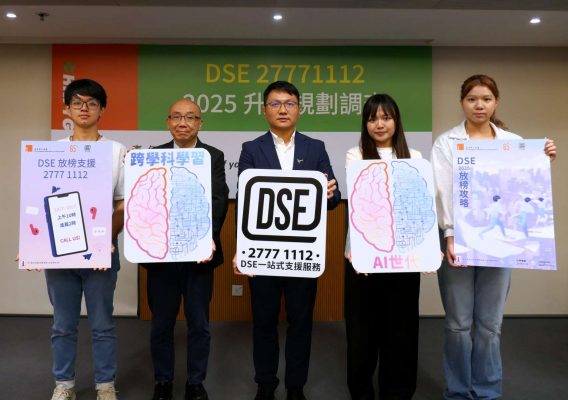青協「DSE 27771112」公布「DSE 2025 升學規劃調查」結果
Summary
- “DSE 27771112,” The Hong Kong Federation of Youth Groups’ (HKFYG) emotional support service for HKDSE exam takers, today (10 July) released a new survey on further education planning among current and upcoming candidates.
- The survey involved a total of 1,456 secondary students, comprising 490 current candidates in Form 6 and 966 upcoming candidates in Form 5.
Stress levels
- 9% of current candidates reported high stress levels (7-10 out of 10) while awaiting their results, up from 41.7% last year, a record-high since 2020.
- Similarly, 57.1% of upcoming candidates also reported high stress levels while preparing for the exams, comparable to 57.6% recorded last year.
Study plans
- Among the 490 current candidates, nearly three-fifths (59%) aim for a bachelor’s degree. If not accepted into their desired JUPAS programmes, they would consider pathways such as enrolling in self-funded associate degree (54.7%) and self-funded bachelor’s degree (39.6%) programmes; 25.9% would plan to start working while studying; 18.8% and 14.3% would opt for studying abroad and in the Mainland, respectively.
Concerns & priorities
- Looking towards the future, current candidates are worried (64.7%) and confused (54.5%), but 44.5% remain hopeful, looking forward to what’s to come. In total, 48.2% of current candidates find it “very difficult” to plan for their future path, a three-year high.
- When planning for further education, current candidates base their decisions on their “personal interests” (75.9%), “final results” (73.9%) and the “economic outlook and career prospects” (57.3%). Among these factors, “economic outlook and career prospects” rose from 47.6% last year to 57.3% this year, by nearly 10 percentage points.
The rise of AI
- The availability of interdisciplinary AI programmes also affects subject choices. 91.4% of current candidates are aware of such programmes offeredby tertiary institutions, while 19.8% plan to apply.
- As AI continues to shape the education and employment landscape, 94.1% of the Secondary 5 and 6 students surveyed believe that AI skills are essential for further education and future employment.
Frontline observations
- Andy Chan, Supervisor at the HKFYG, noted, “We have seen a climb in stress levels among candidates, associated with factors such as the economic slowdown and shrinking job market. These have made it more challenging to plan for an uncertain future.” He encouraged candidates to come up with backup plans in case results turn out differently than expected.
- He added, “Many candidates already recognise AI as a core future skill. With 14 new interdisciplinary AI tertiary programmes offered this year, we advise that students develop interdisciplinary thinking skills when choosing which courses to study, as the key to success in the AI era lies in applying AI across different fields flexibly and holistically.”
Support services
- “DSE 27771112” has handled 8,415 cases from 1 September 2024 to 9 July 2025. Among the cases are a candidate experiencing emotional breakdowns even after the exams leading up to the results release, a media design aspirant fearing an AI-disrupted future, and a parent feeling ill-equipped to support his children in making choices in a fast-changing AI era.
- To help students plan for their future with streamlined information, “DSE 27771112” has published a “DSE Results Release Guide,” available in both soft and hard copies. The guide this year includes the latest information on the AI-related programmes on offer.
- As results day approaches, “DSE 27771112” will extend its support services from 14 to 19 July. Students and parents in need can reach out for help via its hotline and online counselling platform, utouch.hk, where they can access immediate advice and support.
- To better support students and parents, the HKFYG’s Tin Yuet, Tin Yiu, Lung Hang, Tseung Kwan O, Verbena and Cheung Wah Youth S.P.O.Ts will host a night event on 15 July to cheer up DSE candidates expecting their results, and extend opening hours on the morning of 16 July.


